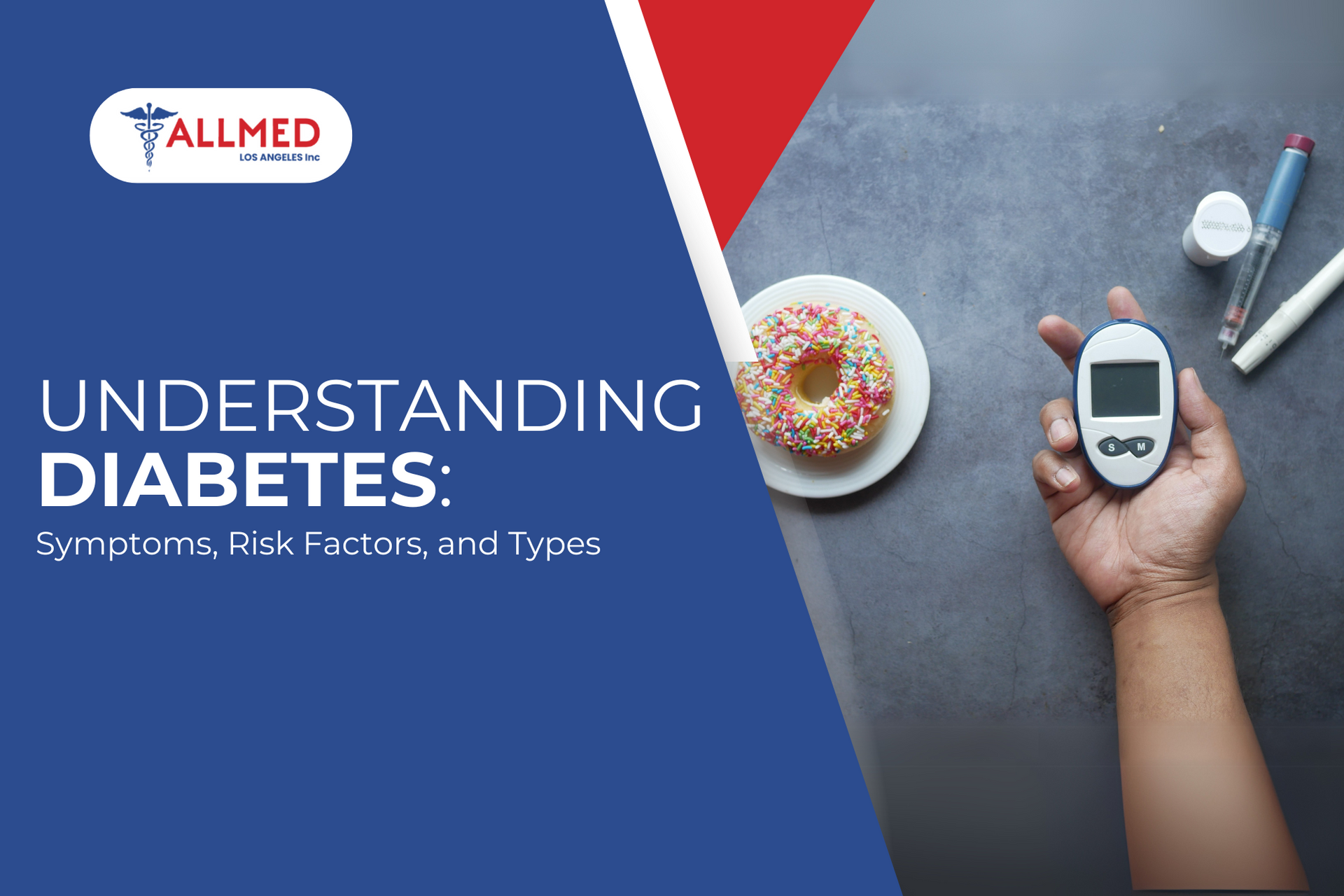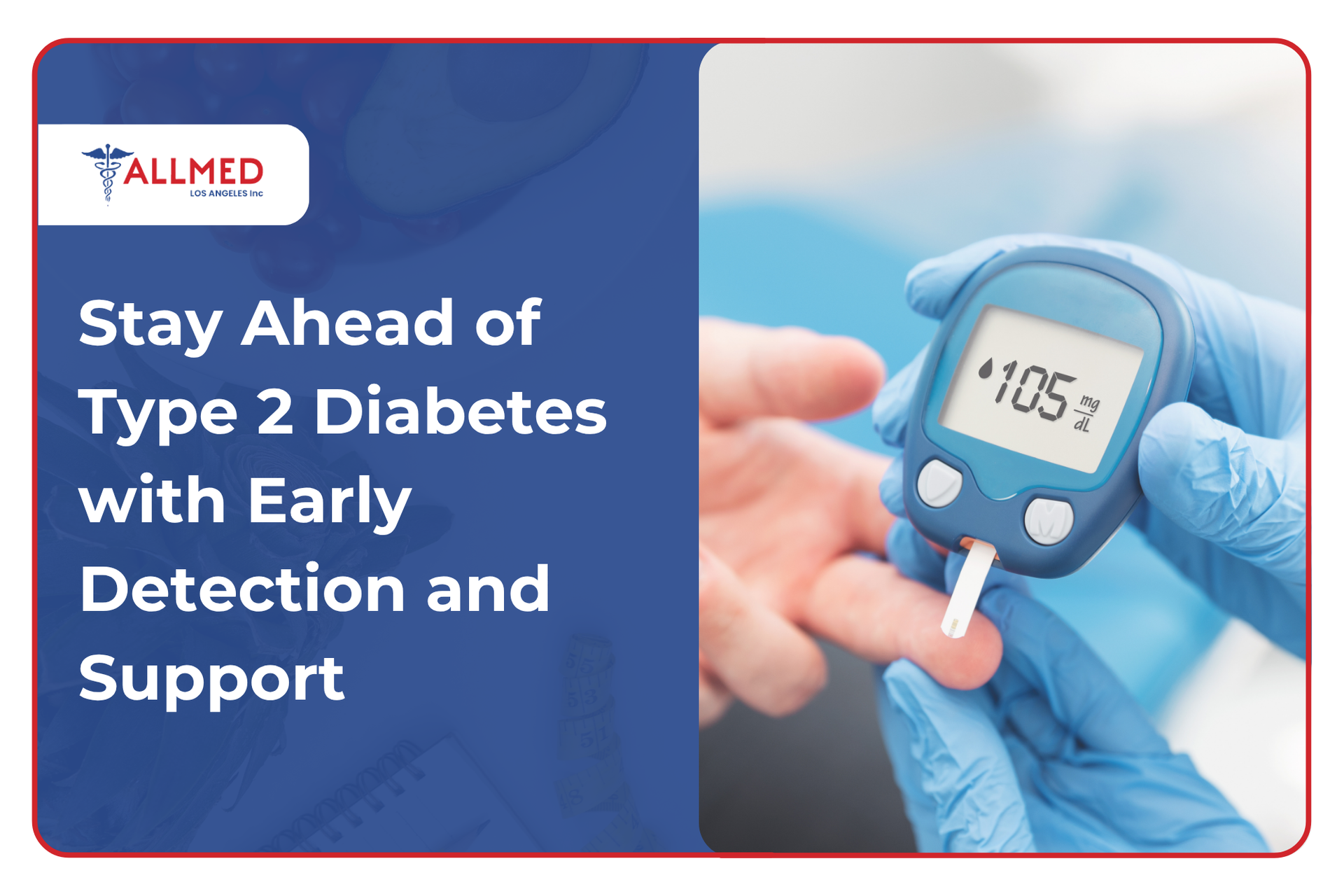Are you constantly thirsty? Maybe you’re always tired or have noticed that wounds take longer to heal than usual. These could be signs of diabetes.
Diabetes is a health condition that often sneaks up without clear warning signs—until it starts affecting your life. Dismissing the symptoms may put your health at greater risk.
This article will help you recognize early symptoms, understand risk factors, and differentiate between the types of diabetes so you can take action early and protect your health. Seeking timely medical advice can lead to an early
diagnosis of diabetes or help manage an existing condition before complications arise.
Get a Diabetes Risk Assessment at Allmed LA!
Types of Diabetes
Diabetes is a chronic health condition that affects the body’s ability to regulate blood sugar. It stems from problems with insulin, an essential hormone that allows cells to absorb glucose and convert it into energy. Diabetes occurs when the body doesn’t produce enough insulin, cannot use it effectively, or both.
There are different types of diabetes, each with unique causes and varying ages of onset. Doctors usually diagnose it through blood tests during
annual wellness exams, checking blood sugar levels for irregularities. The three main types are:
Type 1 Diabetes
Type 1 diabetes is a lifelong autoimmune disorder where the immune system mistakenly attacks and destroys the insulin-producing beta cells in the pancreas. Although doctors typically diagnose it in children and young adults, it can develop at any age. Managing Type 1 diabetes requires lifelong insulin therapy to maintain stable blood sugar levels.
Type 2 Diabetes
Type 2 diabetes is the most widespread form of the disease. It develops when the body becomes resistant to insulin, or the pancreas struggles to produce enough of it. Lifestyle factors like inactivity, poor diet, and obesity often trigger the onset of this disease. While anyone can develop it, it’s most prevalent in individuals over 45.
Gestational Diabetes
This type of diabetes affects pregnant women due to hormonal changes that increase the body’s resistance to insulin. It often goes unnoticed as it typically lacks clear symptoms and is usually detected through prenatal screening. Though it generally resolves after giving birth, it does increase the mother's risk of developing Type 2 diabetes later in life.
Symptoms of Diabetes
Diabetes manifests through different symptoms that may vary depending on the type. Recognizing these symptoms is crucial for timely diagnosis and treatment.
Type 1 diabetes symptoms usually appear quickly and tend to be more intense. These might include:
- Unexplained weight loss
- Feeling unusually thirsty all the time
- Blurred vision
- Mood changes
- Frequent trips to the restroom
- Hunger despite eating
- Constantly tired and low on energy
Type 2 diabetes symptoms develop more slowly and can be subtle; sometimes, they are not noticeable until complications arise. Common symptoms include
- Increased thirst and urination
- Increased appetite
- Fatigue
- Blurred vision
- Slow healing of wounds
- Numbness and tingling in the hands and feet
- Areas of darkened skin, particularly around the neck and armpits
What is Prediabetes?
Did you know that the CDC estimates that 1 in 3 American adults, or over 84 million people, have prediabetes?
Prediabetes is a condition in which blood sugar (glucose) levels are higher than normal but not yet high enough to be classified as Type 2 diabetes. It is a warning sign that the body is becoming insulin-resistant or that the pancreas is not producing enough insulin. Without intervention, prediabetes significantly increases the risk of developing Type 2 diabetes.
The good news is that you can reverse prediabetes by improving your diet, increasing your physical activity, and managing your weight. If you suspect prediabetes, consult a healthcare professional for blood tests, such as the A1C, fasting glucose, or oral glucose tolerance test.
What Causes Diabetes?
How do you develop diabetes? Unlike Type 1 diabetes, which results from an autoimmune reaction, Type 2 diabetes develops mainly due to genetic predisposition and lifestyle factors. Below are its leading causes.
Genetic Factors
Having a close relative with Type 2 diabetes increases one's likelihood of developing the condition. Genetics influences how the body produces and uses insulin and stores fat. However, having the genes associated with Type 2 diabetes does not guarantee its onset; lifestyle choices significantly impact whether these genetic risks materialize.
Insulin Resistance
Diabetes develops when muscle, fat, and liver cells ignore or resist insulin's signals to absorb glucose from the bloodstream into the cells. When the body becomes resistant to insulin, glucose builds up in the bloodstream, resulting in elevated blood sugar levels. Over time, the pancreas struggles to keep up and can no longer produce enough insulin to compensate, eventually leading to diabetes.
Obesity and Fat Distribution
Excess weight, particularly abdominal fat, significantly increases the risk of developing Type 2 diabetes. Abdominal fat releases hormones and chemicals that can disrupt the body's metabolic and cardiovascular functions, making it harder for the body to respond to insulin. This explains why waist size strongly predicts diabetes risk beyond overall body mass index (BMI).
Sedentary Lifestyle
Physical inactivity is another significant risk factor. Muscle cells have insulin receptors that become more active and increase their number in response to exercise. Regular physical activity thus helps muscle cells use blood glucose for energy and muscle contraction, lowering blood glucose levels and enhancing cells' sensitivity to insulin.
Poor Diet
Diets rich in refined sugars, fats, and calories but lacking in nutrients contribute to obesity and insulin resistance. High consumption of processed meat, sugary beverages, and red meat is associated with a greater risk of diabetes.
Aging
The risk of developing Type 2 diabetes rises as people age, especially after 45. This is due to factors like reduced activity, weight gain, muscle loss, and the pancreas producing less insulin over time. Another factor is that the pancreas becomes less efficient at making insulin over time.
Who Is at Risk?
Diabetes can affect anyone, but certain factors might increase your risk. Understanding these can help you assess your risk level and take proactive steps toward prevention or early management.
- Those with a family history of diabetes
- People with a sedentary lifestyle
- Individuals with a BMI over 25
- Women with a waist circumference of more than 35 inches and men with more than 40 inches
- People over the age of 45
- Individuals with high blood pressure and cholesterol
- Certain
ethnic groups (Native Americans, African Americans, Hispanic Americans, and some Asian Americans)
Complications of Diabetes
Keeping diabetes under control is vital, not just to stabilize blood sugar levels but to protect your body from a range of potential health issues. If left untreated,
diabetes can cause severe complications such as:
- Higher risk of heart disease, hypertension, and stroke
- Nerve damage (neuropathy), which causes numbness, tingling, or pain in the hands, feet, and limbs
- Kidney damage (nephropathy), leading to potential kidney failure or severe dysfunction
- Eye damage such as diabetic retinopathy, cataracts, and glaucoma
- Foot damage that can cause infections or ulcers and amputation due to nerve damage and poor blood flow
- Skin conditions, including bacterial and fungal infections
- Hearing impairment
- increased risk of dementia, including Alzheimer's disease
Diabetes Diagnosis and Treatment at Allmed LA!
Are you concerned about diabetes or at risk of developing it? At
Allmed LA, we’re dedicated to helping you take charge of your health. Start with a diabetes risk assessment to understand your risk and create a plan to manage or prevent the condition. Prevent complications of diabetes with the help of our
trusted healthcare providers.
Whether you’re focused on preventing prediabetes or need guidance for managing diabetes, we’ll work with you every step of the way.
Don’t wait for warning signs—schedule an appointment today!















